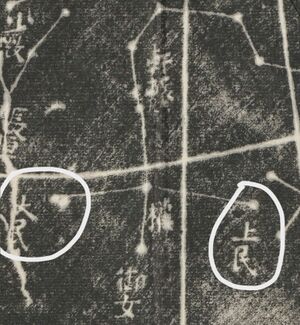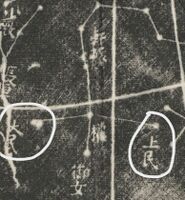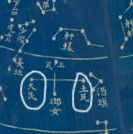Taimin & Shaomin (太民、少民)
Taimin and Shaomin
Taimin太民 (or Damin大民) for o Leo and Shaomin少民 (ρ Leo) are the two southernmost stars of the Xuanyuan轩辕 constellation. They used to star names in ancient China.
Etymology & History of the term
The shape of Xuanyuan resembles a Chinese dragon, and these two stars are considered the left and right horns of the dragon. The specific meanings of Taimin and Shaomin are difficult to determine. However, according to the Western Han dynasty's Shi School Star Canon(石氏星经), they were referred to as Taiming太明 (or Daming大明, both means "more bright") and Shaoming少明(means "less bright").[1] Literally, Taiming should be brighter than Shaoming, which is indeed the case:
- Taiming is omicron Leonis (o Leo) with a magnitude of 3.5, while
- Shaoming is rho Leonis (ρ Leo) with a magnitude of 3.8.
It is noteworthy that "Ming" and "Min" sound very similar, leading to the possible evolution of "Taiming" and "Shaoming" into "Taimin" and "Shaomin" over time.
According to ancient Chinese star divination theory, Xuanyuan represents the group of empresses and consorts. Under this context, these two stars were given specific meanings: Taimin represented the clan of the Empress Dowager, while Shaomin represented the clan of the Empress. This interpretation was established during the Han dynasty.
Images and Transformation
From the perspective of Xuanyuan the dragon itself, omi Leo as the left horn (Taimin) and rho Leo as the right horn (Shaomin) is very natural. However, from the viewpoint of an observer within the celestial sphere, Shaomin is actually on the left (east) and Taimin on the right (west). This may be the reason why the positions of Taimin and Shaomin were later swapped, as shown in the Suzhou astronomical chart. The Suzhou chart mistakenly recorded Shaomin as Shangmin上民, which was further erroneously written as Tumin土民 in the Qing dynasty star map.
- Taimin and Shaomin
References
- ↑ Qutan Xida. Kaiyuanzhanjing 开元占经. Beijing: Jiuzhou Press, 2012:643-644.







